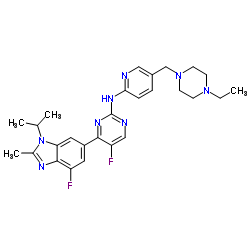Lilly Provides Update on MONARCH 2 Phase 3 Trial of Abemaciclib
INDIANAPOLIS, IN, USA - August 10, 2016 - Eli Lilly and Company (NYSE: LLY) today announced that following a pre-planned interim analysis for MONARCH 2, an independent Data Monitoring Committee (DMC) provided the recommendation to continue the study without modification as the interim efficacy criteria were not met. The MONARCH 2, Phase 3 trial compares abemaciclib plus fulvestrant* versus placebo with fulvestrant in women with hormone-receptor-positive (HR+), human epidermal growth factor receptor 2-negative (HER2-) locally advanced or metastatic breast cancer.
"We had stringent criteria set for this interim analysis and we look forward to receiving the final MONARCH 2 results in the first half of 2017," said Richard Gaynor, M.D., senior vice president, product development and medical affairs for Lilly Oncology. "We remain optimistic that treatment with abemaciclib, in combination with fulvestrant could offer improved outcomes for patients."
The Phase 3, double-blind study, designed to evaluate the safety and efficacy of abemaciclib in combination with fulvestrant, was conducted across 142 sites worldwide. The intent-to-treat population of 669 patients was randomized to receive abemaciclib or placebo orally every 12 hours on a continuous dosing schedule, given in combination with fulvestrant at the approved dose and schedule, until disease progression. Patients enrolled in the study had experienced disease progression on or within 12 months of receiving endocrine treatment in the neoadjuvant or adjuvant setting or while receiving first-line endocrine therapy for metastatic disease. Patients who had received chemotherapy in the metastatic setting were not eligible for the study. The primary endpoint for MONARCH 2 is progression-free survival (PFS).
The trial will continue into the first half of 2017 and will include a final analysis of PFS, overall survival and safety data.
Lilly will await further data and continue to work with the FDA to inform its submission plan for single-agent abemaciclib, based on the MONARCH 1 study. This Phase 2 study evaluated the single-agent activity and safety of abemaciclib in patients with refractory metastatic breast cancer, whose disease had progressed following multiple prior treatments, including chemotherapy.
Along with MONARCH 1 and MONARCH 2, Lilly currently has three additional MONARCH trials evaluating abemaciclib in breast cancer. MONARCH 3 is a Phase 3 trial of abemaciclib in combination with a nonsteroidal aromatase inhibitor in patients with HR+, HER2- locoregionally recurrent or metastatic breast cancer. Additionally, there are two Phase 2 MONARCH trials: neoMONARCH, which is evaluating abemaciclib in combination with a nonsteroidal aromatase inhibitor in the neoadjuvant setting, and monarcHER, which is evaluating abemaciclib plus trastuzumab (with or without fulvestrant) in women with HR+, HER2+ locally advanced or metastatic breast cancer.
About Metastatic Breast Cancer
Breast cancer is the most common cancer in women worldwide with nearly 1.7 million new cases diagnosed in 2012.1 In the U.S. this year, approximately 246,660 new cases of invasive breast cancer will be diagnosed and about 40,450 people will die from breast cancer.2 Of all early stage breast cancer cases diagnosed in the U.S., approximately 30 percent will become metastatic, spreading to other parts of the body. In addition, an estimated six to 10 percent of all new breast cancer cases are initially diagnosed as being stage IV, or metastatic.3 Metastatic breast cancer is considered incurable, but is generally treatable.
About Abemaciclib
Abemaciclib (LY2835219) is an investigational, oral cell cycle inhibitor, designed to block the growth of cancer cells by specifically inhibiting cyclin-dependent kinases, CDK 4 and CDK 6. In many cancers, uncontrolled cell growth arises from a loss of cell cycle regulation due to increased signaling from CDK 4 and CDK 6. Abemaciclib inhibits both CDK 4 and CDK 6, and was shown in cell-free enzymatic assays to be most active against Cyclin D 1 and CDK 4.
In 2015, the U.S. Food and Drug Administration granted abemaciclib Breakthrough Therapy Designation based on data from the breast cancer cohort expansion of the company's Phase 1 trial, JPBA, which studied the efficacy and safety of abemaciclib in women with advanced or metastatic breast cancer. In addition to its current MONARCH clinical trials evaluating abemaciclib in breast cancer, a Phase 3 trial of abemaciclib in lung cancer is also underway.
About Lilly Oncology
For more than 50 years, Lilly has been dedicated to delivering life-changing medicines and support to people living with cancer and those who care for them. Lilly is determined to build on this heritage and continue making life better for all those affected by cancer around the world. To learn more about Lilly's commitment to people with cancer, please visit www.LillyOncology.com.
About Eli Lilly and Company
Lilly is a global healthcare leader that unites caring with discovery to make life better for people around the world. We were founded more than a century ago by a man committed to creating high-quality medicines that meet real needs, and today we remain true to that mission in all our work. Across the globe, Lilly employees work to discover and bring life-changing medicines to those who need them, improve the understanding and management of disease, and give back to communities through philanthropy and volunteerism. To learn more about Lilly, please visit us at www.lilly.com and newsroom.lilly.com/social-channels.
Published on Wednesday, 10 August 2016
Source: http://pipelinereview.com/




